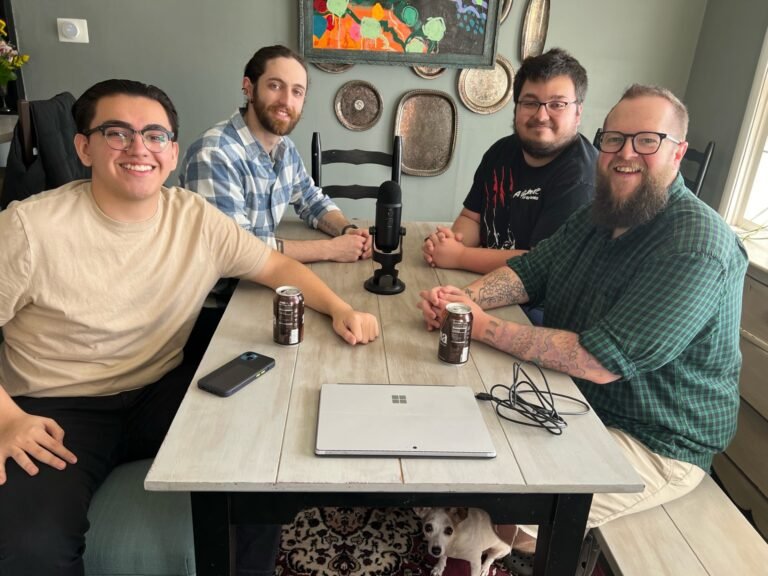Greg Chewning, a clinical mental health counseling student, and his friends often talked about mental health at coffee shops and restaurants. And strangers were also taking part in it.
“I think they’re hearing it being discussed in a kind of eye-opening way,” Chewning said. “It became obvious to us that one day we thought, ‘Why don’t we make this more public, because something is really going on here?'”
Chewning suggested starting a podcast based on his past experience, and friends Alec Dulaney, Damien Montañez and Timber Keller also agreed.
“Are you a theory person?”
“Are You a Theorist?” explores mental health, counseling theory, and the group’s experiences as counseling students at Wichita State University. Topics range from self-care and body language to diagnostic manuals and Sigmund Freud.
Chewning said the podcast aims to “increase people’s wonder about human emotions and relationships,” while also providing “a new perspective” on the mental health debate.
“I knew right away there was something for everyone,” Chewning said. “We’re talking about mental health disorders. Or we’re talking about anxiety, depression, spirituality. Things that everyone knows (or) has felt and experienced.”
Podcast members incorporate the magnetic energy of everyday conversations into weekly episodes. The group says such discussions are usually “free-flowing” and natural.
The four chat for about two hours every other Sunday, and then Tuning edits and splits it into four episodes. Each episode varies in length but is usually around 30 minutes.
“When we all got together and talked about the things we cared about around each other, we had so much fun that we couldn’t stop,” Dulaney said.
Montañez said the group’s true dynamic is also evident to professors listening to the podcast.
“They say this all the time, because you can tell just by listening to them, that we all have a very good connection. And that’s what they strive for with men in general[in the counseling program]. “It’s something we’re doing,” Montañez said.
Four graduate students said their podcasts are gaining traction within their graduate programs. When Montañez and Keller attended a practicum orientation, several attendees recognized them.
“I was talking to Timber, and the guy stopped, turned around, and said, ‘I know your voice,'” Montañez said. “He was like, ‘I’ve been listening to your podcast, and I think it’s great.'” And literally four people came up after him and said the same thing. ”
Dulaney hopes the podcast continues to be a resource for counseling students, both at Wichita State and elsewhere.
“It can just be fun to hear about someone trying to overcome a challenge, and we’re really looking forward to that,” Dulaney said. “We all love this program and this field, so there is an encouraging energy that is very contagious.”
The podcast now also features special guests such as Marriage and Family Therapist and Director of Wichita Counseling Programs, Jody Fiorini. All four of us enjoyed talking with our guests and learned more about Fiorini beyond our previous interactions.
“She has a lot of experience working with people with disabilities, so that was really interesting,” Chewning said. “That was a whole side of her that I didn’t really get to learn in her classes.”
During my time with Fiorini, the discussion touched on how the podcast group is “open to expressing themselves” with all men. Montañez said professors call podcasters positive models because they are expressive people who discuss mental health.
Chewning hopes the podcast can break down stereotypes and encourage men to be more reflective, and Keller hopes men understand they can ask for help when they need it. thinking.
“Men often seek independence rather than asserting themselves or receiving social support,” Keller says. “Having these role models and experiences with other men who have ‘survived’ and sought help is really beneficial.”
Keller, Dulaney and Montañez took this goal beyond the podcast. They presented their research on supporting men in counseling at the Kansas State Counselor Association Annual Conference on March 1.
The podcasters said the mental health clinical program is made up of primarily female students, and Dulaney said the group is all male, which results in “bonding” the students together. . Their friendship extends beyond podcast recordings to Super Bowl nights to group chats filled with what Montañez calls “the most horrifyingly bad dad jokes.”
The group’s energy, involving strangers in coffee shop conversations, still resonates with students and professors, some of whom are willing to travel three hours to present their research.
“Professors always say, ‘Oh my gosh, you guys and your podcast,'” Keller said. “The professors even wanted to ride in the car with us on the way there because they said, “The teacher interaction is so fun and so energizing.”
Available in “Are you a theory person?” spotify; new episodes will be released on Saturdays.


